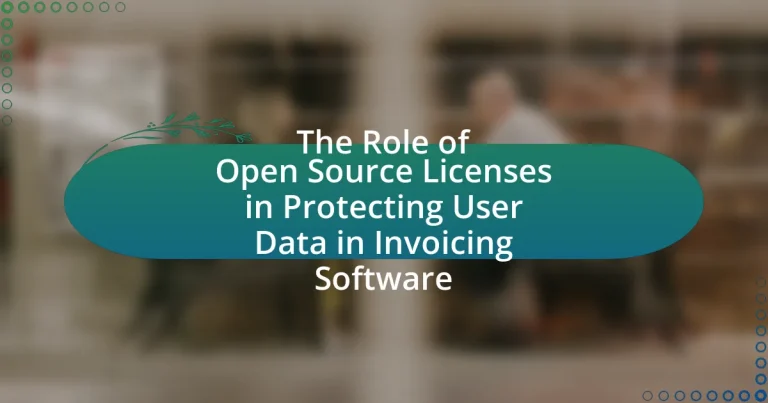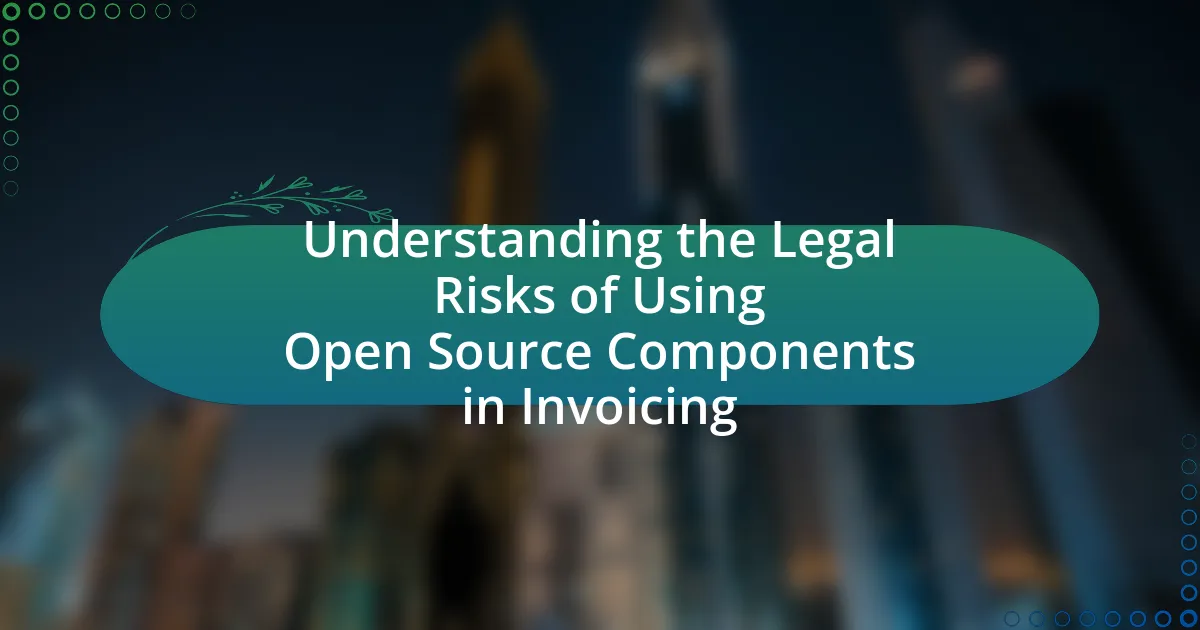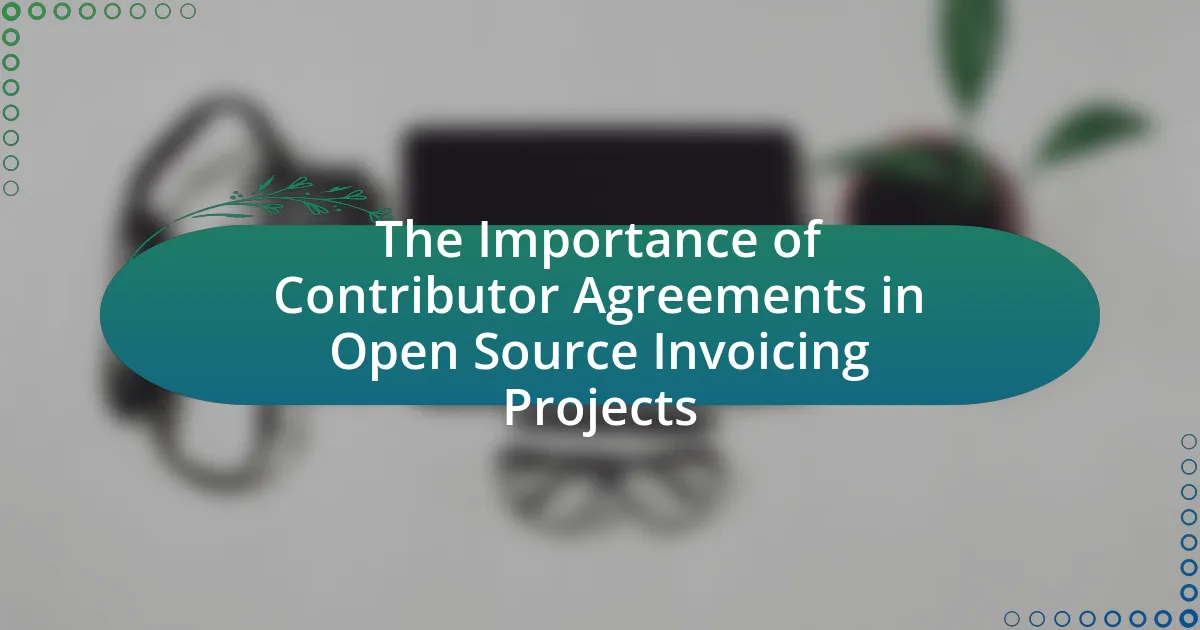Open source licenses are legal agreements that facilitate the free use, modification, and distribution of software, playing a vital role in software development by promoting collaboration and innovation. This article examines the significance of open source licenses in protecting user data within invoicing software, detailing how these licenses function, their key components, and their impact on user rights and responsibilities. It highlights the importance of transparency and community involvement in enhancing data security, compares open source and proprietary licenses regarding data protection, and discusses the challenges and best practices for businesses to ensure compliance and safeguard user data effectively.
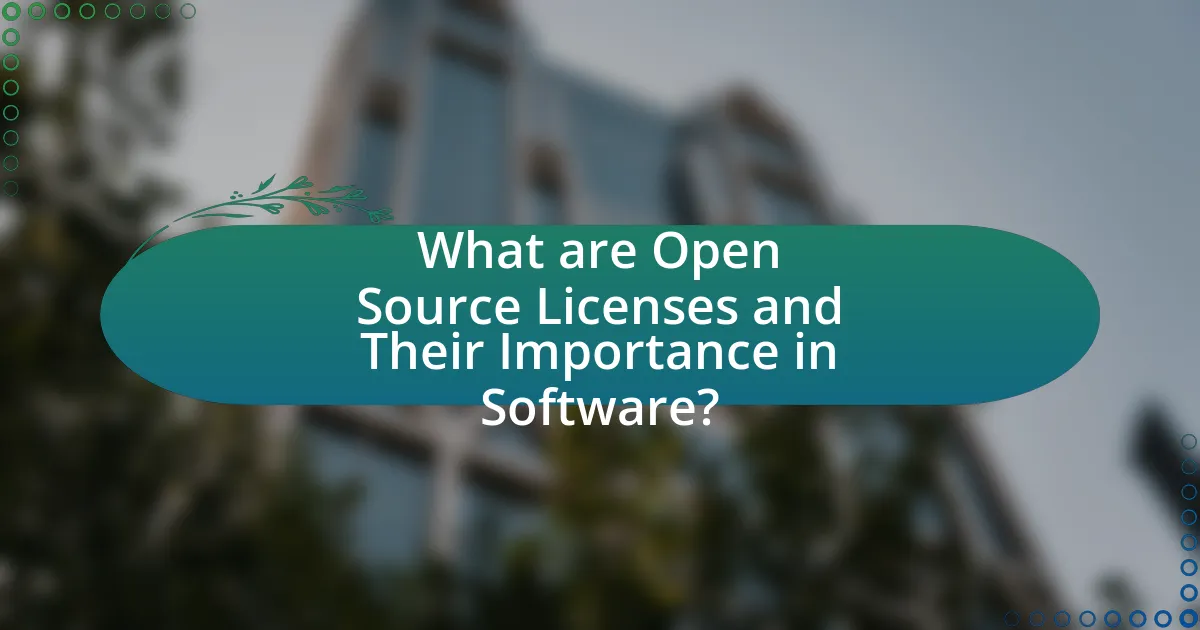
What are Open Source Licenses and Their Importance in Software?
Open source licenses are legal agreements that allow software to be freely used, modified, and distributed by anyone. These licenses are crucial in software development as they promote collaboration, innovation, and transparency, enabling developers to build upon existing code while ensuring that the original authors receive credit and maintain certain rights. For instance, the GNU General Public License (GPL) requires that any derivative work also be open source, thus protecting the freedom of users and developers alike. This framework fosters a community-driven approach to software development, which can lead to more secure and reliable software solutions, particularly in areas like invoicing software where user data protection is paramount.
How do Open Source Licenses function in software development?
Open source licenses function in software development by allowing developers to use, modify, and distribute software while ensuring that the original creators retain certain rights. These licenses establish the terms under which software can be shared and altered, promoting collaboration and innovation within the developer community. For example, the GNU General Public License (GPL) requires that any modified versions of the software also remain open source, thereby protecting the freedom of users to access and modify the software. This framework not only fosters a collaborative environment but also enhances security and transparency, as the source code is available for scrutiny, which is particularly important in applications like invoicing software that handle sensitive user data.
What are the key components of Open Source Licenses?
The key components of Open Source Licenses include permissions, conditions, and limitations. Permissions define what users can do with the software, such as using, modifying, and distributing it. Conditions often require users to attribute the original authors or share modifications under the same license. Limitations may restrict the use of the software for specific purposes or impose liability disclaimers. These components ensure that the software remains open and accessible while protecting the rights of both the authors and users, fostering collaboration and innovation in software development.
How do these components influence user rights and responsibilities?
Open source licenses significantly influence user rights and responsibilities by defining how users can access, modify, and distribute software. These licenses grant users the right to use the software freely while imposing responsibilities such as the obligation to share modifications under the same license terms. For instance, the GNU General Public License (GPL) requires that any derivative work also be open source, ensuring that user contributions remain accessible to the community. This framework not only protects user data by promoting transparency and collaboration but also establishes a clear legal structure that users must adhere to, thereby enhancing accountability in the use of invoicing software.
Why are Open Source Licenses critical for user data protection?
Open Source Licenses are critical for user data protection because they promote transparency and accountability in software development. By allowing users to access and review the source code, these licenses enable independent verification of how user data is handled, reducing the risk of malicious practices. For instance, a study by the Open Source Initiative found that open source software is less likely to contain hidden vulnerabilities or backdoors, as the code is subject to scrutiny by a global community of developers. This collaborative oversight fosters a secure environment where user data is better protected against unauthorized access and exploitation.
What specific protections do Open Source Licenses offer for user data?
Open Source Licenses provide specific protections for user data by ensuring that the source code is publicly available, allowing users to inspect, modify, and share the software. This transparency helps prevent hidden data collection practices, as users can verify how their data is handled. Additionally, many open source licenses include clauses that prohibit the use of the software for surveillance or data mining without user consent, reinforcing user privacy rights. For instance, licenses like the GNU General Public License (GPL) require that any modifications made to the software also remain open source, which further protects user data by ensuring that any changes that could affect data handling are subject to public scrutiny.
How do Open Source Licenses compare to proprietary licenses in terms of data protection?
Open source licenses generally provide stronger data protection compared to proprietary licenses because they allow users to inspect, modify, and share the source code, which enhances transparency and accountability. This transparency enables users to identify and rectify potential vulnerabilities or data handling issues, as seen in projects like Linux and Apache, where community scrutiny has led to robust security practices. In contrast, proprietary licenses often restrict access to the source code, limiting users’ ability to verify how their data is managed and protected, which can lead to potential risks, as evidenced by incidents involving data breaches in proprietary software like Adobe and Microsoft. Thus, the open-source model fosters a collaborative environment that prioritizes user data protection through community oversight and continuous improvement.
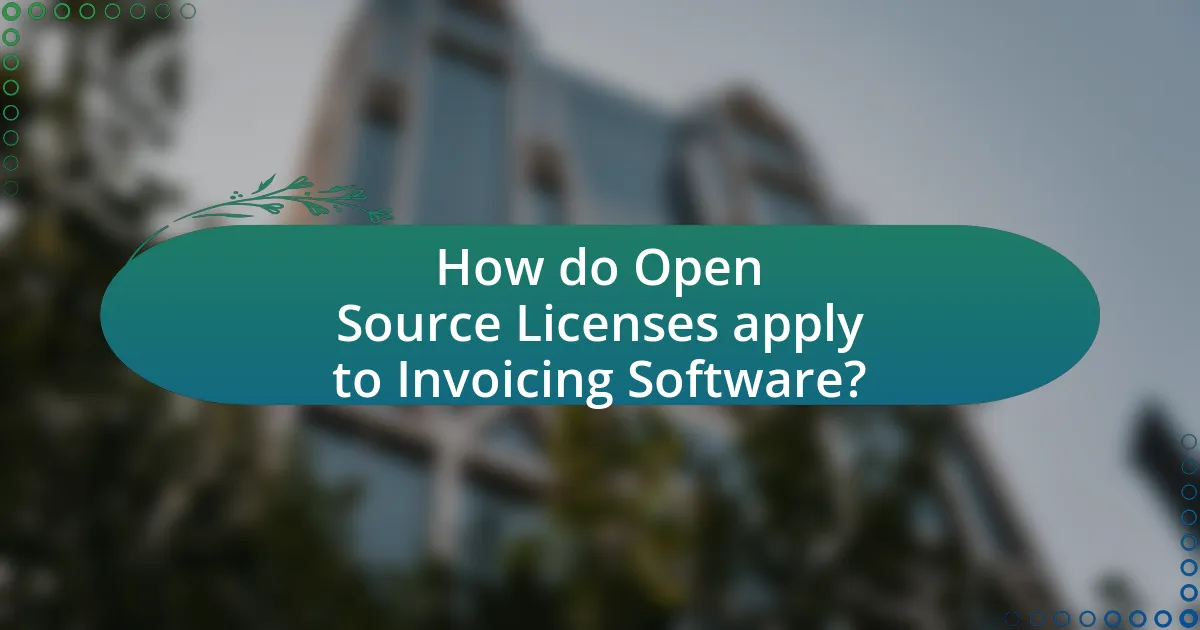
How do Open Source Licenses apply to Invoicing Software?
Open source licenses apply to invoicing software by allowing users to access, modify, and distribute the software’s source code under specified conditions. These licenses, such as the GNU General Public License or the MIT License, ensure that users can customize the invoicing software to meet their specific needs while also promoting transparency and collaboration within the software community. For instance, the GPL requires that any derivative work also be open source, which helps maintain user control over the software and protects against proprietary restrictions. This openness can enhance user data protection, as users can audit the code for security vulnerabilities and ensure compliance with data protection regulations.
What are the common types of Open Source Licenses used in invoicing software?
Common types of Open Source Licenses used in invoicing software include the GNU General Public License (GPL), the MIT License, and the Apache License 2.0. The GNU GPL requires that any derivative work also be open source, ensuring that user modifications remain accessible. The MIT License is permissive, allowing for proprietary use while maintaining attribution, which can be beneficial for businesses. The Apache License 2.0 also permits proprietary use but includes provisions for patent rights, providing additional legal protection for users. These licenses are widely adopted in the software community, promoting collaboration and transparency while safeguarding user data.
How do these licenses affect the functionality of invoicing software?
Open source licenses significantly influence the functionality of invoicing software by determining how the software can be modified, shared, and integrated with other systems. These licenses allow developers to access the source code, enabling customization to meet specific business needs, which enhances the software’s adaptability and functionality. For instance, under the GNU General Public License, users can modify the software to add features like automated tax calculations or multi-currency support, thereby improving user experience and operational efficiency. Additionally, open source licenses promote community collaboration, leading to faster bug fixes and feature enhancements, which directly impacts the software’s reliability and performance.
What are the implications of using different licenses for user data security?
Using different licenses for user data security can significantly impact how data is managed, shared, and protected. For instance, permissive licenses may allow broader access and modification of software, which can lead to vulnerabilities if not properly managed, while copyleft licenses enforce stricter sharing and modification rules, potentially enhancing security by ensuring that improvements are shared back with the community. According to a study by the Open Source Initiative, software under copyleft licenses tends to have more robust security practices due to community oversight and collaborative development. Thus, the choice of license directly influences the security posture of user data in software applications.
How do Open Source Licenses enhance transparency in invoicing software?
Open Source Licenses enhance transparency in invoicing software by allowing users to access, review, and modify the source code. This accessibility enables users to verify how their data is handled and ensures that the software adheres to privacy standards. For instance, studies show that open-source projects often have higher scrutiny from the community, leading to quicker identification and resolution of security vulnerabilities. Additionally, the collaborative nature of open-source development fosters a culture of accountability, as developers are incentivized to maintain high ethical standards in data management.
What role does community involvement play in maintaining data security?
Community involvement plays a crucial role in maintaining data security by fostering collaboration and vigilance among users and developers. Engaged communities can identify vulnerabilities, share best practices, and contribute to the development of security patches, enhancing the overall security posture of software. For instance, open-source projects benefit from community scrutiny, which often leads to quicker identification and resolution of security issues compared to proprietary software. Research indicates that community-driven initiatives can reduce the average time to fix vulnerabilities, thereby significantly improving data security outcomes.
How can users verify the security of their data through Open Source Licenses?
Users can verify the security of their data through Open Source Licenses by reviewing the license terms that govern the software’s use and distribution. Open source licenses, such as the GNU General Public License or the MIT License, often include clauses that require transparency in the software’s source code, allowing users to inspect the code for vulnerabilities or malicious elements. This transparency enables users to assess the security measures implemented in the software and ensures that any modifications or contributions to the code are also made available, fostering a community-driven approach to security. Additionally, the collaborative nature of open source projects often leads to quicker identification and resolution of security issues, as many developers can contribute to improving the software’s security.
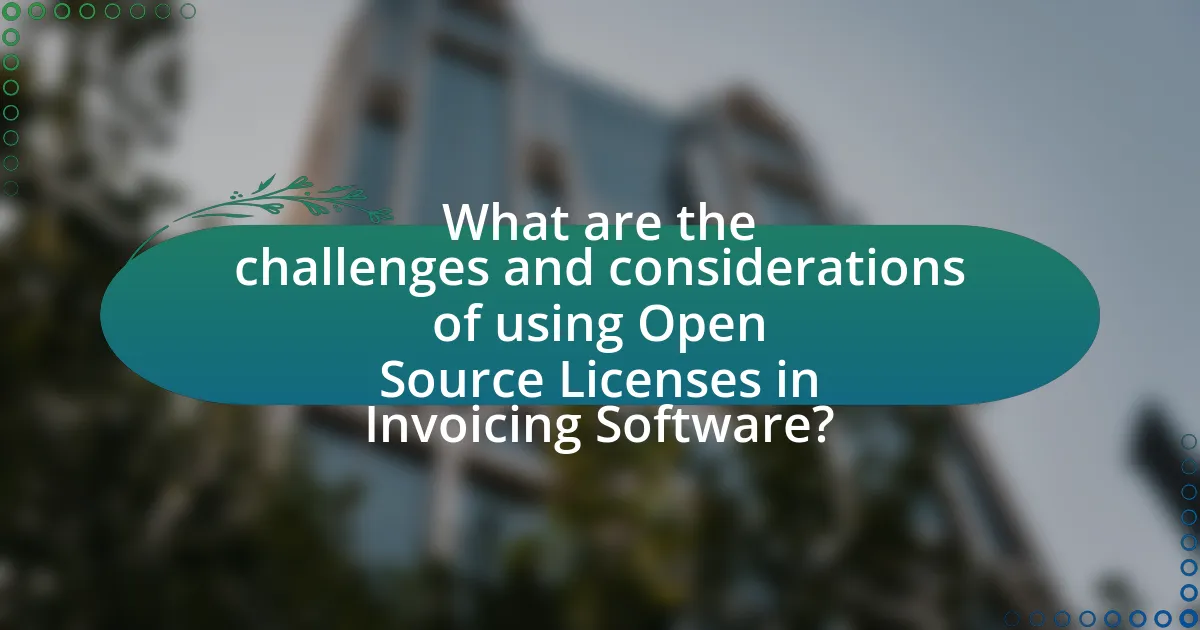
What are the challenges and considerations of using Open Source Licenses in Invoicing Software?
Using Open Source Licenses in invoicing software presents challenges such as compliance with license terms, potential security vulnerabilities, and the need for ongoing maintenance. Compliance requires understanding various licenses, like GPL or MIT, which can impose restrictions on how the software is used or modified. Security vulnerabilities arise from the open nature of the code, which can be exploited if not properly managed. Additionally, maintaining open source software necessitates continuous updates and support, which can strain resources. These challenges highlight the importance of careful consideration when integrating open source solutions into invoicing systems.
What potential risks do users face when using Open Source Invoicing Software?
Users face several potential risks when using Open Source Invoicing Software, including security vulnerabilities, lack of support, and compliance issues. Security vulnerabilities arise because open source software can be modified by anyone, potentially introducing malicious code or bugs that compromise user data. The lack of dedicated support means users may struggle to resolve issues or receive timely updates, increasing the risk of using outdated or insecure software. Additionally, compliance issues can occur if the software does not adhere to relevant regulations, such as GDPR, which can lead to legal penalties. These risks highlight the importance of careful evaluation and management when adopting open source invoicing solutions.
How can users mitigate these risks effectively?
Users can mitigate risks effectively by implementing strong security practices and choosing reputable open source licenses. Strong security practices include regularly updating software to patch vulnerabilities, using encryption for sensitive data, and employing access controls to limit data exposure. Reputable open source licenses, such as the GNU General Public License or the MIT License, ensure that users have the right to modify and audit the software, which enhances transparency and security. According to a study by the Open Source Security Foundation, organizations that adopt open source software with robust licensing experience fewer security incidents due to the collaborative nature of open source development, which often leads to quicker identification and resolution of vulnerabilities.
What are the common misconceptions about Open Source Licenses and data protection?
Common misconceptions about Open Source Licenses and data protection include the belief that open source software inherently lacks security and that using open source licenses means relinquishing control over user data. In reality, open source software can be as secure as proprietary software, depending on the development practices and community support. Additionally, open source licenses often allow developers to maintain control over how data is used and shared, as many licenses include specific terms regarding data protection and user privacy. For instance, the General Public License (GPL) requires that any derivative works also remain open source, which can enhance transparency and accountability in data handling.
How can businesses ensure compliance with Open Source Licenses in invoicing software?
Businesses can ensure compliance with Open Source Licenses in invoicing software by implementing a robust compliance management system that includes thorough documentation, regular audits, and employee training. This system should track all open source components used in the software, ensuring that the terms of each license are understood and adhered to. For instance, businesses must comply with licenses like the GNU General Public License, which requires that any derivative works also be open source. Regular audits can help identify any non-compliance issues, while training employees on the importance of open source licenses fosters a culture of compliance. By following these practices, businesses can mitigate legal risks associated with open source software usage.
What best practices should businesses follow to protect user data?
Businesses should implement strong encryption methods to protect user data. Encryption secures sensitive information both in transit and at rest, making it unreadable to unauthorized users. According to a 2021 report by the Ponemon Institute, organizations that use encryption experience 50% fewer data breaches compared to those that do not. Additionally, businesses should regularly update their software to patch vulnerabilities, conduct employee training on data protection, and establish clear data access policies to minimize risks. These practices collectively enhance the security of user data and reduce the likelihood of breaches.
How can businesses educate their teams about Open Source License compliance?
Businesses can educate their teams about Open Source License compliance by implementing structured training programs that cover the fundamentals of open source licenses, their implications, and compliance requirements. These training programs should include workshops, online courses, and regular seminars led by legal experts or compliance officers who specialize in open source software.
Additionally, businesses can provide accessible resources such as documentation, guidelines, and case studies that illustrate real-world scenarios of compliance and non-compliance. Regular updates on changes in open source licensing laws and practices can also be shared through internal newsletters or dedicated communication channels.
Research indicates that organizations with comprehensive training on software compliance experience fewer legal issues and better adherence to licensing terms, highlighting the importance of ongoing education in this area.
What practical steps can users take to safeguard their data in Open Source Invoicing Software?
Users can safeguard their data in Open Source Invoicing Software by implementing strong password policies, regularly updating the software, and utilizing encryption for sensitive information. Strong passwords reduce the risk of unauthorized access, while regular updates patch vulnerabilities that could be exploited by attackers. Encryption protects data at rest and in transit, ensuring that even if data is intercepted, it remains unreadable. According to a study by the Ponemon Institute, organizations that employ encryption experience 50% fewer data breaches, highlighting the effectiveness of these measures in protecting sensitive information.
